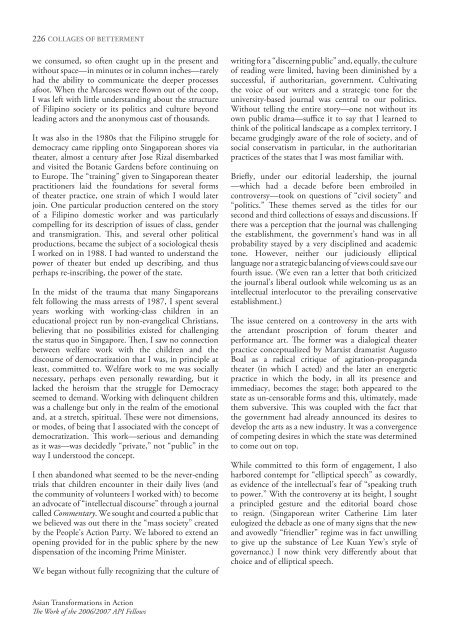Asian Transformations in Action - Api-fellowships.org
Asian Transformations in Action - Api-fellowships.org
Asian Transformations in Action - Api-fellowships.org
Create successful ePaper yourself
Turn your PDF publications into a flip-book with our unique Google optimized e-Paper software.
226 COLLAGES OF BETTERMENTwe consumed, so often caught up <strong>in</strong> the present andwithout space—<strong>in</strong> m<strong>in</strong>utes or <strong>in</strong> column <strong>in</strong>ches—rarelyhad the ability to communicate the deeper processesafoot. When the Marcoses were flown out of the coop,I was left with little understand<strong>in</strong>g about the structureof Filip<strong>in</strong>o society or its politics and culture beyondlead<strong>in</strong>g actors and the anonymous cast of thousands.It was also <strong>in</strong> the 1980s that the Filip<strong>in</strong>o struggle fordemocracy came rippl<strong>in</strong>g onto S<strong>in</strong>gaporean shores viatheater, almost a century after Jose Rizal disembarkedand visited the Botanic Gardens before cont<strong>in</strong>u<strong>in</strong>g onto Europe. The “tra<strong>in</strong><strong>in</strong>g” given to S<strong>in</strong>gaporean theaterpractitioners laid the foundations for several formsof theater practice, one stra<strong>in</strong> of which I would laterjo<strong>in</strong>. One particular production centered on the storyof a Filip<strong>in</strong>o domestic worker and was particularlycompell<strong>in</strong>g for its description of issues of class, genderand transmigration. This, and several other politicalproductions, became the subject of a sociological thesisI worked on <strong>in</strong> 1988. I had wanted to understand thepower of theater but ended up describ<strong>in</strong>g, and thusperhaps re-<strong>in</strong>scrib<strong>in</strong>g, the power of the state.In the midst of the trauma that many S<strong>in</strong>gaporeansfelt follow<strong>in</strong>g the mass arrests of 1987, I spent severalyears work<strong>in</strong>g with work<strong>in</strong>g-class children <strong>in</strong> aneducational project run by non-evangelical Christians,believ<strong>in</strong>g that no possibilities existed for challeng<strong>in</strong>gthe status quo <strong>in</strong> S<strong>in</strong>gapore. Then, I saw no connectionbetween welfare work with the children and thediscourse of democratization that I was, <strong>in</strong> pr<strong>in</strong>ciple atleast, committed to. Welfare work to me was sociallynecessary, perhaps even personally reward<strong>in</strong>g, but itlacked the heroism that the struggle for Democracyseemed to demand. Work<strong>in</strong>g with del<strong>in</strong>quent childrenwas a challenge but only <strong>in</strong> the realm of the emotionaland, at a stretch, spiritual. These were not dimensions,or modes, of be<strong>in</strong>g that I associated with the concept ofdemocratization. This work—serious and demand<strong>in</strong>gas it was—was decidedly “private,” not “public” <strong>in</strong> theway I understood the concept.I then abandoned what seemed to be the never-end<strong>in</strong>gtrials that children encounter <strong>in</strong> their daily lives (andthe community of volunteers I worked with) to becomean advocate of “<strong>in</strong>tellectual discourse” through a journalcalled Commentary. We sought and courted a public thatwe believed was out there <strong>in</strong> the “mass society” createdby the People’s <strong>Action</strong> Party. We labored to extend anopen<strong>in</strong>g provided for <strong>in</strong> the public sphere by the newdispensation of the <strong>in</strong>com<strong>in</strong>g Prime M<strong>in</strong>ister.We began without fully recogniz<strong>in</strong>g that the culture ofwrit<strong>in</strong>g for a “discern<strong>in</strong>g public” and, equally, the cultureof read<strong>in</strong>g were limited, hav<strong>in</strong>g been dim<strong>in</strong>ished by asuccessful, if authoritarian, government. Cultivat<strong>in</strong>gthe voice of our writers and a strategic tone for theuniversity-based journal was central to our politics.Without tell<strong>in</strong>g the entire story—one not without itsown public drama—suffice it to say that I learned toth<strong>in</strong>k of the political landscape as a complex territory. Ibecame grudg<strong>in</strong>gly aware of the role of society, and ofsocial conservatism <strong>in</strong> particular, <strong>in</strong> the authoritarianpractices of the states that I was most familiar with.Briefly, under our editorial leadership, the journal—which had a decade before been embroiled <strong>in</strong>controversy—took on questions of “civil society” and“politics.” These themes served as the titles for oursecond and third collections of essays and discussions. Ifthere was a perception that the journal was challeng<strong>in</strong>gthe establishment, the government’s hand was <strong>in</strong> allprobability stayed by a very discipl<strong>in</strong>ed and academictone. However, neither our judiciously ellipticallanguage nor a strategic balanc<strong>in</strong>g of views could save ourfourth issue. (We even ran a letter that both criticizedthe journal’s liberal outlook while welcom<strong>in</strong>g us as an<strong>in</strong>tellectual <strong>in</strong>terlocutor to the prevail<strong>in</strong>g conservativeestablishment.)The issue centered on a controversy <strong>in</strong> the arts withthe attendant proscription of forum theater andperformance art. The former was a dialogical theaterpractice conceptualized by Marxist dramatist AugustoBoal as a radical critique of agitation-propagandatheater (<strong>in</strong> which I acted) and the later an energeticpractice <strong>in</strong> which the body, <strong>in</strong> all its presence andimmediacy, becomes the stage; both appeared to thestate as un-censorable forms and this, ultimately, madethem subversive. This was coupled with the fact thatthe government had already announced its desires todevelop the arts as a new <strong>in</strong>dustry. It was a convergenceof compet<strong>in</strong>g desires <strong>in</strong> which the state was determ<strong>in</strong>edto come out on top.While committed to this form of engagement, I alsoharbored contempt for “elliptical speech” as cowardly,as evidence of the <strong>in</strong>tellectual’s fear of “speak<strong>in</strong>g truthto power.” With the controversy at its height, I soughta pr<strong>in</strong>cipled gesture and the editorial board choseto resign. (S<strong>in</strong>gaporean writer Cather<strong>in</strong>e Lim latereulogized the debacle as one of many signs that the newand avowedly “friendlier” regime was <strong>in</strong> fact unwill<strong>in</strong>gto give up the substance of Lee Kuan Yew’s style ofgovernance.) I now th<strong>in</strong>k very differently about thatchoice and of elliptical speech.<strong>Asian</strong> <strong>Transformations</strong> <strong>in</strong> <strong>Action</strong>The Work of the 2006/2007 API Fellows
















